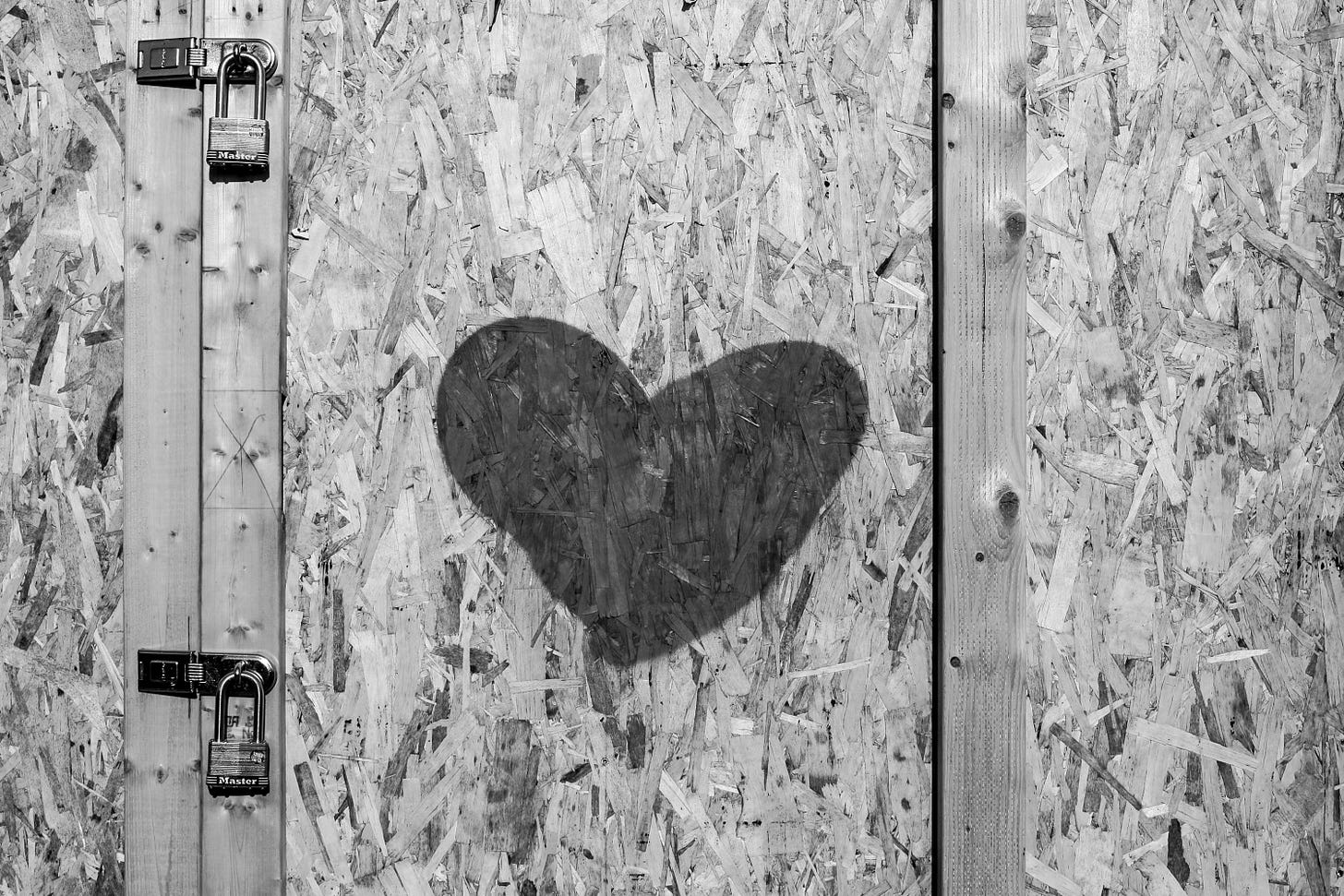Some terms seem to float like feathers effortlessly into the lexicon, settling as though into concrete and accruing layers of meaning they never used to have. “Closure” is all over the place in our culture. See also: self-care, narcissist.
I thought I would occasionally wade in and investigate what some of these terms actually mean, and how they can be used and misused.
So, does this sound familiar?: After a night spent raking over the pain of a past or dying relationship, one half turns to the other:
We’ve got to keep talking, otherwise I’ll never understand. How can I move on without closure?
It’s a kind of self-centred reset button - the demand for closure sends the discussion right back to its painful beginning, and the couple continue to try to rationalise pain and alleviate the guilt.
Then there are those who view themselves as closure’s virtuous messengers (I see this too often for comfort):
I had no choice but to go round and tell his wife. She had a right to know and how else was I going to achieve closure?”
Dramatic yes, but it’s doubtful whether anything “closes”. Rather, the confrontation that ensues launches another round of recriminations.

Where did closure come from?
Closure was one of the Gestalt Laws of Organisation, a set of theories of perception devised in the twenties and thirties. They claimed that when shown incomplete pictures, our mind automatically fills in the blanks.
Look at the diagram below. What do you see?
A triangle on top of another triangle and some circles - although really there is no actual complete triangle or circle there. The idea being, of course, that the human brain cannot deal with the complexity of messy relationships and is compelled to tidy everything up.
Common sense, the closure principle and Taylor Swift
Closure can make intuitive sense, as a way to tie up loose ends, move on and avoid making the same mistakes.
It’s also true, though, that the clients who turn up to my office seeking to understand a relationship break-up often have a hidden agenda when they talk about closure.
Some are desperate to hold onto the relationship. After all, if their partner can name the problem, they can solve it. “We drifted apart,” is met with “we can do more together.” “You don’t listen,” is matched to “I’m listening now.”
Then there are those who have accepted the relationship is over and subconsciously hope to skip some of the pain by rationalising it and packing it away.
Taylor Swift’s song, Closure, is a brilliant riposte from the person on the other end of this desire to tidy up someone else’s pain and deposit it firmly in the past:
It cut deep to know ya
Right to the bone
Yes, I got your letter
Yes, I'm doing better
I know that it's over
I don't need your closure
Sadly, the desire to find a shortcut through grief usually doesn’t work, even for the party who’s decided they are more than ready. No matter how much you understand something, it will still hurt like hell.
So what do I do if I feel stuck?
There can be a place for dramatic gestures, like throwing clothes into the garden. But this is catharsis, not closure. And avoid anything over-the-top and nasty as you’ll inevitably find that guilt slows down and poisons your recovery journey. Be patient.
In bereavement (and relationship break-up is very similar) it takes about a year to feel something approaching normal. The most satisfactory answers come from inside: not from someone else.
So, however tempting, don’t contact your ex again. Instead try writing down the story, putting words on paper can help distance yourself. Another useful formula is to write a letter but not post it.
Other people imagine writing to the person they were at significant stages of their relationship. Alternatively record everything on your phone and play it back several weeks later.
Sometimes a simple ceremony can be helpful too.For example burning the story you wrote, revisiting old haunts with new eyes or even choosing to honour the relationship by planting a new tree in your garden.
Maybe this is the key. Instead of rubbishing what was shared together, ultimately it is better to repackage the pain into something positive. I look back at one painful parting as the moment I started writing. Another former lover introduced me to meditation. In even bad relationships, there is a lesson to be learnt.

When this DOESN’T work, someone who feels stuck should take a long hard look at the benefits in staying where they are. This seems mad, because who would want to keep hurting? But sometimes, it feels safer to hang onto a failed relationship than face hidden fears.
When I’ve dug deeper with clients, they come up with things like: “I’ll never find anyone else to love me.” When these underlying assumptions are out in the open, they can be properly challenged and the clients move on.
Ultimately, though, we also have to ask if closing a door on the past is even possible or desirable. Shouldn’t the goal to be to integrate the past into the future?
In other news, The Meaningful Life with Andrew G. Marshall was recently nominated for a British Podcast Award, in the category of sex and relationships. If you’re a fan, I’d be so grateful if you could vote for us in the Listener’s Choice category.
And I highly recommend my recent interview with Catherine Mayer - cofounder of the Women’s Equality Party and founder of the Primadonna Festival - about losing her husband and her stepfather in early 2020. We shared our experiences of losing partners, and delved deep into grief and loss and how it all relates to love.
You can find the interview on The Meaningful Life podcast page, or listen right here:
And as always, if it feels like the right time to start marital therapy, send an email to Tricia (tricia@andrewgmarshall.com) for a virtual or in-person appointment with one of my team of therapists in London, or with me here in Berlin.
With love,
Andrew



